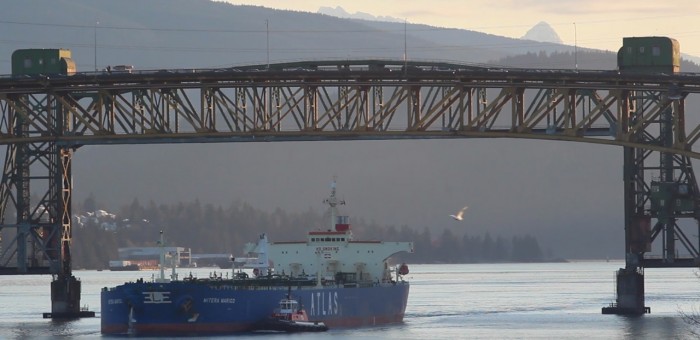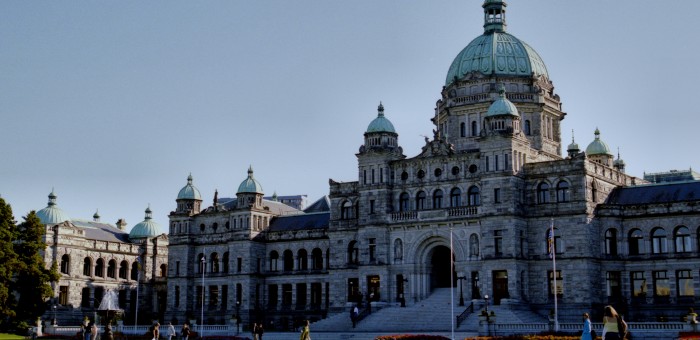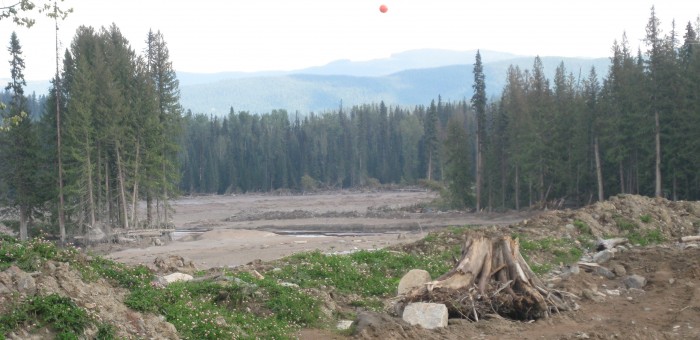Environment
Confidence Lost in NEB Assessment Process for Trans Mountain Pipeline
At some point it’s time to say enough is enough.
For months now we’ve seen mounting evidence that the National Energy Board (NEB) hearings on the Trans Mountain pipeline are seriously flawed. Cross-examination has been declined, deadlines for submission of information are short, intervenors can’t get their questions answered, relevant concerns are being ignored, and attempts to fix the process are shut down by the very organization that is tasked with protecting our interests: the NEB.
Last week, Trans Mountain sued Burnaby residents for “trespassing” on public parkland and sought an injunction against obstruction to the work they were mandated to conduct. In essence, they were asking the courts to intervene in the democratic right of Burnaby residents to protest against a project that neither had their support, not that of the City of Burnaby.
At the same time, one of the most credible intervenors, Marc Eliesen, quit the hearing process. With over 40 years of experience in the energy sector, Eliesen is a former board member of Suncor Energy, CEO of B.C. Hydro, Chair of Manitoba Hydro and deputy minister in several federal and provincial governments. He issued a scathing letter to the National Energy Board outlining the reasons for his exit and specifically cited concerns that the NEB was failing to fulfill its role as an impartial, transparent review body.
Back in 2010 when the BC Provincial Government and the Federal Government signed the “Environmental Assessment Equivalency Agreement” the province chose to streamline the assessment process by unifying what had previously been two separate provincial and federal environmental reviews.
This could have worked well if the interests of British Columbians were properly taken into account during the Energy Board hearings. Unfortunately what we have seen is a federally-run process that is ignoring our concerns. It is imperative that we remedy this now, before it’s too late.
Enough is enough. Our provincial government must reclaim British Columbia’s right to have our own, made-in-BC, hearing process. They can and should do so by immediately issuing the 30 day notice, required to cancel its equivalency agreement for this project with the Federal government. British Columbia could then launch its own, separate, environmental assessment. It’s time for the government to step up and protect our interests for it’s clear that the National Energy Board is not doing so.
Losing Leadership on Provincial Climate Policies
This week was a clear reminder of why I decided to run for office.
Back in 2008, I had the honour of working with then Premier Gordon Campbell, his Minister of Environment, the Honourable Barry Penner and the Climate Action Team to outline clear, bold and practical steps that we as a province could take to address global warming.
Together with government, academics, industry leaders, and First Nations, we developed a suite of policies that would allow us to reduce our carbon emissions while supporting strong economic growth. Six years later, British Columbia’s climate policies were still seen as leading the way in North America.
On Monday the Liberal government tabled a bill that threatens to undermine that success.
Bill 2: The Greenhouse Gas Industrial Reporting and Control Act would see British Columbia repeal legislation that would have enabled us to enter a cap and trade framework with our Pacific Coast climate action partners. In its place, we would adopt new legislation that would see us embrace what’s called an “emissions intensity” scheme along the lines of what Alberta and the Harper Tories have done.
Whereas a cap and trade framework would force us to reduce the total amount of carbon we emit into the atmosphere, an emissions intensity scheme would only require businesses to reduce the amount of carbon produced in liquefying a specified quantity of natural gas.
Here’s the problem: Our climate doesn’t care about emissions intensity. Our climate cares about the overall magnitude of emissions. If we increase the production of LNG, even if it is produced more and more efficiently, emissions are still going up. Ultimately, the climate only cares about the total amount of carbon pollution a facility would release and how much carbon pollution is in our atmosphere.
An emissions intensity scheme wouldn’t limit the overall carbon emissions. That’s why if you compare Alberta’s emissions to British Columbia’s, you will see that while British Columbia’s emissions decreased in the last few years, Alberta’s increased.
So why are we going down this path? Because the government knows that emissions are going to skyrocket if we develop our LNG industry. And an Alberta or Harper Government style emissions intensity model will provide the illusion of action on global warming at the same time as our overall magnitude of carbon emissions continue to increase. That’s all this is: The illusion of action.
The simple fact is, if we pass this bill, we may as well say goodbye to all of the progress we have made, for we will be stepping into a new era as one of the most polluting provinces in Canada.
As part of the debate on this Bill, I introduced an amendment that proposed that the Legislature delay debate on this Bill for 6 months. This would allow us as MLAs to put more time and thought into this Bill, and to ensure that we have carefully thought through the consequences of losing our leadership in addressing global warming. My amendment was voted down 40 to 28, with the BC NDP voting in support of the amendment.
Here is a quick guide to my four main areas of critique for this piece of legislation.
- The bill will see B.C. undermine its highly effective climate policies with an Alberta-style emissions intensity framework that has been shown to be ineffective at reducing net emissions. This is the same type of framework that was adopted federally by PM Stephen Harper’s Conservative Government, amidst significant criticism.
- Under an emissions intensity framework, the magnitude of net carbon emissions can increase significantly despite the emissions intensity decreasing. Ultimately, the magnitude of net carbon emissions is the only thing that matters as far as global warming is concerned. This change is being made to allow for a dramatic increase in carbon emissions from the proposed LNG industry.
- The bill would repeal the Greenhouse Gas Reduction (Cap and Trade) Act that was passed as enabling legislation to allow B.C. to enter into a regional cap and trade framework with other jurisdictions including California, Washington and Oregon. A cap and trade framework would allow B.C. to reduce the magnitude of net carbon emissions.
- The bill would give cabinet the power to change the 0.16 emissions intensity limit through regulation without having to bring it back to the legislature for debate. This is the key point of the legislation that the government points to as evidence of their pledge to have the “cleanest LNG” in the world. The fact that “cleanest LNG” is not fixed in legislation, should raise significant concerns about the government’s commitment to this limit.
Please consider reading through the entire text of my speech for a more detailed explanation of my opposition to Bill 2.
Media Statement: October 22, 2014
MLA Weaver Tables Amendment to LNG Emissions Act
For immediate release
Victoria, B.C. – The B.C. Government’s proposed Greenhouse Gas Industrial Reporting and Control Act (Bill 2) is a rushed piece of legislation that undermines our climate leadership and puts our ability to reduce future emissions at risk, says Andrew Weaver, MLA for Oak Bay – Gordon Head and Deputy Leader of the B.C. Green Party.
Today in the legislature, Andrew Weaver spoke to his concerns and submitted a hoist amendment that called for the bill to be delayed by 6 months to give MLAs and the public more time to scrutinize it.
The bill, which went into second reading today, would see British Columbia adopt an Alberta-style emissions intensity framework. This framework would allow overall emissions to increase in the Province, even as the Government would be taking credit for a reduction in the emissions intensity.
“Our climate cares very little for accounting tricks,” said Andrew weaver. “If we are going to take our responsibility to tackle climate change seriously, the only thing that truly matters is whether we are reducing the quantity of carbon emissions we are releasing. This bill won’t do that.”
Another major concern with the Bill is the apparent “blank-cheque” that it awards government. The legislation would effectively allow cabinet to re-write major sections of the legislation through regulations without the scrutiny of the House. British Columbians will not know many crucial details until well after Bill 2 is passed, and the Government will have avoided essential scrutiny that only the House can provide.
Finally, the bill would repeal the Greenhouse Gas Reduction (Cap and Trade) Act (2007) that was passed to enable a regional cap and trade framework with other jurisdictions including California, Oregon and Washington.
“It has become a political necessity for this government to land LNG, no matter what the cost is to British Columbians. With Bill 2, the cost may be our leadership in the fight on global warming,” said Andrew Weaver. “This Bill is asking us to choose between continuing forward with a singular focus on LNG, or taking seriously our responsibility to reduce this province’s Greenhouse gas emissions. Under this proposed legislation it will be impossible for us to have it both ways.”
Weaver’s amendment was voted down 28 to 40 with the BC NDP voting in support of the amendment.
-30-
Media Contact
Mat Wright – Press Secretary, Andrew Weaver MLA
Mat.Wright@leg.bc.ca
Cell: 1 250 216 3382
Probing the Details of the Government Mitigation Plan for Mount Polley
Today in the legislature I was up in Question Period. I took the opportunity to ask the government to outline the steps they are taking to address growing concerns about the lack of response to the short-term environmental, social and economic impacts stemming from the Mount Polley tailings pond breach. Below is the text of my exchange with the Minister of the Environment. I think you will find that it was a very informative discussion.
MY QUESTION
Honourable speaker, It does not serve the public interest to either overestimate or underestimate the scale of what happened at Mount Polley.
We know that on August 4th 2014, the tailings pond at Mount Polley mine breached and 25 million cubic metres of water, tailings and construction material was released into Hazleton Creek, Lake Polley and Quesnel Lake. We also know that on August 5th the Ministry of Environment issued a Pollution Abatement Order to Mount Polley Mining Corporation to comply with a detailed list of requirements pursuant to Section 83 of the Environmental Management Act.
Madame speaker, in May of this year (just weeks before the Mount Polley incident), and after extensive consultation with a variety of stakeholders, the Ministry developed both a Policy on, and accompanying Procedures for, Mitigating Impacts on Environmental Values.
My question through you, honourable speaker, to the Minister of the Environment is this:
The government has an environmental mitigation policy and procedure. Is the government applying them to Mount Polley disaster as part of the pollution abatement order. If not, why not?
MINISTER POLAK’S RESPONSE
I thank the member for the question. We would not ordinarily apply the environmental mitigation policy and procedure to a situation like this, simply because it’s really designed for activities that avoid, minimize, restore or offset what we see as foreseeable impacts of developments when we’re in the planning phase.
However, in this instance — and, of course, it’s unprecedented — I’m advised by staff that as they are reviewing the long-term remediation plan and the comprehensive environmental impact assessment, they’re finding that these guidelines are proving very useful as tools in order to fully develop that plan. It doesn’t directly relate, but it certainly is a part of the review that the ministry, along with other agencies, is conducting on the long-term plan.
MY SUPPLEMENTAL QUESTION
Honourable Speaker, I recently visited the Mount Polley region.
I’ve spoken with local residents, First Nations, mining officials, limnologists, geologists, geochemists and many others. Numerous British Columbians have independently contacted me.
Honourable speaker it is clear to me that British Columbians want to know how government plans to:
- deal with any local environmental impacts;
- deal with any local social impacts;
- deal with the significance that this event is having on the BC mining industry – a pillar of BC’s economy
My question through you to the minister is this. Will the government please outline its environmental, social and economic mitigation strategy for dealing with the repercussions of the Mount Polley tailings pond breach.
MINISTER POLAK’S RESPONSE
Of course, the member has very eloquently articulated just the breadth of the impact of this disaster. It really does take a holistic approach. I will touch only briefly on the responsibilities of other ministries and then outline what’s next in terms of the Ministry of Environment.
I’ve mentioned earlier on that the Ministries of Jobs, Tourism and Skills Training and Aboriginal Relations and Reconciliation have had people in the area working directly with communities, with First Nations. In terms of mining, I know that the Minister of Energy and Mines has been in regular conversations with leaders in the mining industry broadly about the issues this presents for them.
For us…. And it’s very important for me to acknowledge the work of some very key people, that being the Quesnel River Research Centre through UNBC and also one of our key staff people, Jennifer McGuire, who is the head of our regional operations in environmental protection.
We have, as a result, arrived at a couple of working groups, one of which, the environmental working group, you will be aware of from the letter of understanding that we have with the two First Nations. There’s also the Mount Polley science advisory panel. I’ll just quickly…. Representative scientists from DFO, MOE, FLNRO, Environment Canada. There’s industry, of course, First Nations and other university researchers.
Lastly, in the end, they will review the plan. The first phase will take us to June of 2015. The rest of the plan will take us from June of 2015 out into the future. All of that will be made public when the reviews are complete.
Motion to Amend the Fall 2014 Throne Speech
Today I rose in the legislature to give the required two day’s notice that I will bring forward an amendment to the Throne Speech. Delta South Independent MLA Vicki Huntington seconded my notice of motion.
When I speak to the Throne Speech, and subsequently the amendment on Thursday, I will outline an alternative vision for diversified, sustainable, 21st century economy.
Notice to Amend Motion
Be it resolved that the motion “We, Her Majesty’s most dutiful and loyal subjects, the Legislative Assembly of British Columbia, in session assembled, beg leave to thank Your Honour for the gracious speech which your Honour has addressed to us at the opening of the present session,” be amended by adding the following:
And that the Legislative Assembly of British Columbia accepts the responsibility of demonstrating the leadership to choose growth, to move forward and create a legacy for our children, but also recognizes that this leadership means not gambling our future prosperity on a hypothetical windfall from LNG, and instead supports the development of a diversified, sustainable, 21st century economy.
BC Government Silent on Mount Polley
Media Statement: September 22, 2014
BC Government Silent on Mount Polley
For Immediate Release
Victoria B.C. – Andrew Weaver, MLA for Oak Bay – Gordon Head and Deputy Leader of the B.C. Green Party, is calling on the B.C. Government to take immediate steps to address growing concerns about the lack of response to the short-term environmental and economic impacts stemming from the Mount Polley tailings pond breach.
“The Mount Polley tailings pond breach happened over a month and a half ago,” said Andrew Weaver. “Yet local residents are still being kept in the dark about what their government and Imperial Metals are doing to remedy the immediate economic and environmental fall-out from the incident.”
So far the government has only provided information on its monitoring efforts and its commitment to determining the cause of the breach. Local residents are concerned that the government is not doing enough to address more immediate issues, such as financial support for affected families or reclamation of impacted areas.
Andrew Weaver visited the Scwepemc Sacred Fire during his August 28th trip to the region. The Sacred Fire, which was lit on August 18th near the entrance to the mine site, has becomes a community gathering point for those affected to voice their concerns.
“I had an opportunity to hear from people about what they believe needs to be done” said Andrew Weaver. “What I heard more than anything is that residents do not trust that the BC government or Imperial Metals are doing what is necessary to address their concerns. We need to change that.”
Since Andrew Weaver returned from Mount Polley more than three weeks ago, these concerns have continued to grow. His office has received correspondence from residents of Likely, BC, who remain concerned that they have still not heard what steps the BC Government is taking to address the more immediate concerns.
“The fact is, residents of the Mount Polley region shouldn’t have to approach an MLA from Vancouver Island to get answers from the government about what is happening to their region. This is a clear sign that more needs to be done.”
A full report of Andrew Weaver’s trip to the Likely, BC region can be found on his website: http://www.andrewjweaver.ca/2014/09/10/mount-polley-breach-here/
Media Contact
Mat Wright – Press Secretary, Andrew Weaver MLA
mat.wright@leg.bc.ca
1 250 216 3382






